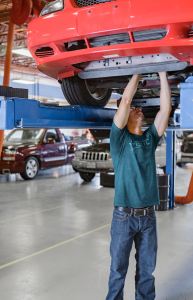(HARLINGEN, Texas) – The revving of engines is music to the ears of students and instructors alike in Texas State Technical College’s Automotive Technology program.
According to the U.S. Bureau of Labor Statistics, careers for automotive service technicians are expected to continue to rise through 2026. TSTC’s Automotive Technology program utilizes a hands-on method of learning that gives students the necessary training needed to excel in the field.
The college offers an Associate of Applied Science degree in Automotive Technology, as well as several options for certificates of completion.
Instructor Diego Trevino said that TSTC students in the program are given the opportunity to study with working vehicles, as well as learn from instructors who have had firsthand industry experience.
“We get to teach from actual running vehicles rather than trainers on a stand,” he said. “All the instructors at TSTC are required to be Master Automotive Service Excellence (ASE) certified and also have an associate degree in the automotive field before they can step into a classroom.”
Bruce Schmitt, also an instructor, added that TSTC’s mission to work closely with students is what sets this program apart.
“We invest in students over a long period of time,” he said. “TSTC is a well-established college throughout the state of Texas.”
He added that the focus on students does not stop once the class ends. Job placement is also a vital component of the program.
“All automotive students are assisted with job placement through our partnerships with local industry partners, both dealership and independent,” he said.
Trevino said that Automotive Technology instructors also do their due diligence to ensure that students are given good opportunities.
“As instructors, we all take time out of our day to visit dealerships and shops across the Rio Grande Valley to create a relationship with them to help our students get their foot in the door,” he said. “We take advantage of the interview practices offered throughout the year to help our students prepare for the interviews with industry partners that we have set up for them by the time they graduate.”
Instructor Miguel Zoleta said that the automotive industry is not slowing down, as far as jobs are concerned.
“I see a rapid rise in demand for the automotive industry, especially in the electrical automotive industry, because many automotive companies are introducing electric lines of vehicles,” he said.
While current safety precautions have impacted the one-on-one time that instructors have with students, Trevino said that this has not deterred the department from finding other ways to guarantee communication, such as distancing with minimal time in the lab, virtual appointments, and even phone calls.
“We are always available by appointment,” he said. “In order for students to really master the automotive craft, whether it is practicing a skill like tire balancing or getting the finer points of engine rebuilding, we try our best to make ourselves available to students however we can.”
To learn more about TSTC, visit tstc.edu.
